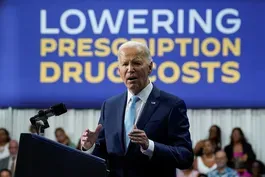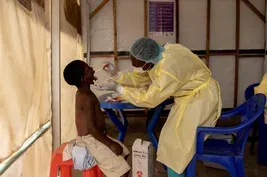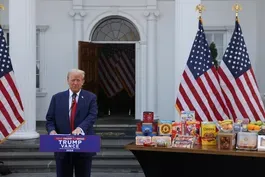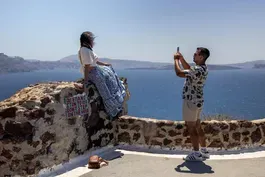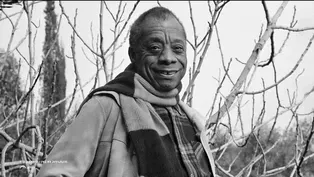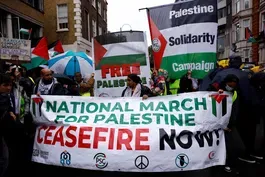
Gazan families shattered as war's death toll crosses 40,000
Clip: 8/15/2024 | 8m 26sVideo has Closed Captions
Gazan families shattered as war's death toll crosses 40,000
Israel blames Hamas for hiding within civilian areas and said it has killed about 17,000 Hamas fighters in Gaza. If that’s true, that still means more than 20,000 civilians have died. Nick Schifrin discussed the staggering death toll in Gaza with Dr. Ahmad Yousaf, an American pediatrician who recently returned from volunteering with the humanitarian group MedGlobal at Gaza’s al-Aqsa Hospital.
Problems with Closed Captions? Closed Captioning Feedback
Problems with Closed Captions? Closed Captioning Feedback
Major corporate funding for the PBS News Hour is provided by BDO, BNSF, Consumer Cellular, American Cruise Lines, and Raymond James. Funding for the PBS NewsHour Weekend is provided by...

Gazan families shattered as war's death toll crosses 40,000
Clip: 8/15/2024 | 8m 26sVideo has Closed Captions
Israel blames Hamas for hiding within civilian areas and said it has killed about 17,000 Hamas fighters in Gaza. If that’s true, that still means more than 20,000 civilians have died. Nick Schifrin discussed the staggering death toll in Gaza with Dr. Ahmad Yousaf, an American pediatrician who recently returned from volunteering with the humanitarian group MedGlobal at Gaza’s al-Aqsa Hospital.
Problems with Closed Captions? Closed Captioning Feedback
How to Watch PBS News Hour
PBS News Hour is available to stream on pbs.org and the free PBS App, available on iPhone, Apple TV, Android TV, Android smartphones, Amazon Fire TV, Amazon Fire Tablet, Roku, Samsung Smart TV, and Vizio.
Providing Support for PBS.org
Learn Moreabout PBS online sponsorshipIsrael blames Hamas for hiding within civilian areas and said today it had killed about 17,000 Hamas fighters.
But even if that's true, that still leaves more than 20,000 civilians dead and, of course, countless families crushed.
In English, there is no word for the father who has lost his children.
Today, Mohammad Abu Al Qumsan surrounded himself with the doll that will never be held, the matching outfits that will never be worn by his twins, Aysal and Aser, born just three days before the family says they were killed in an Israeli strike.
MOHAMMAD ABU AL QUMSAN, Father (through translator): When I married Dr. Joumana and had our two children, my joy was immense.
Unfortunately, I didn't have three days to enjoy their presence.
May God rest their soul.
NICK SCHIFRIN: There are no words for the father who has lost his children.
When he learned of their deaths, he also learned his wife died with them.
In a single moment, he had lost everything, her name written in pen, Dr. Joumana Arafa, who just three days before had posted on Facebook "New twins," a burden too difficult to bear.
And yet he bore the weight of her body, a pallbearer for his own wife.
And he prayed at his family's funeral.
Death stalks Gaza.
And the men who dig Gaza's graves have run out of room.
This is not a cemetery.
It is a patch of sand that Najy Abu Hateb said today could one day be his own.
NAJY ABU HATEB, Grave Digger (through translator): Since the war began, we haven't stopped for even a minute.
We are working beyond our capacity.
I swear, we are destroyed.
Life has been ruined.
We have dug 50, 60, 70 graves daily, until the death toll reached 40,000.
NICK SCHIFRIN: It is the collapse of a community.
This woman has just lost 20 members of her family.
The family says the only survivor of an Israeli strike was 3-month-old Reem (ph), one of 90,000 wounded Gazans and just the latest child identified by Gazan doctors with an appalling label, wounded child, no surviving family Tonight's macabre milestone the reflection of reality -- on average, every day, for 314 days, more than 100 Gazans have died, often before they had the chance to live.
For the "PBS News Hour," I'm Nick Schifrin.
AMNA NAWAZ: Joining us now is Dr. Ahmad Yousaf, an American pediatrician who recently returned from volunteering with the humanitarian group MedGlobal in Gaza's Al-Aqsa Hospital.
He's now back home in Arkansas.
Dr. Yousaf, thank you for joining us.
DR. AHMAD YOUSAF, MedGlobal: Thank you so much for having me.
AMNA NAWAZ: You heard the story there, as my colleague Nick Schifrin reported, of Mohammad Abu Al Qumsan, the father who lost his twins just days after they were born.
So we're able here just to see a slice of these stories from on the ground in Gaza.
You were there.
Tell us what you think when you hear this story.
Were these kinds of stories unusual?
DR. AHMAD YOUSAF: The truth is, this was - - as devastating of a story as that is, this is the everyday story for the Gazan people almost every day I was there in Gaza.
Every day, there were bomb blasts that we heard in the distance.
It sounded like rolling thunder.
And there were drones over our heads 24/7 humming.
And often coinciding with the bomb blasts were mass casualty events that came to the hospital 30 to 45 minutes later, every story devastating, family members and children lost in a manner such as the one that you previously documented.
The only way I can really describe it is, people would come to us in pieces and their family members often were asking us to help in a situation, but there was no way we could meaningfully give them what they deserve in terms of health care.
AMNA NAWAZ: And you are, of course, a pediatrician.
You're focusing on treating children in this environment.
What kind of impact has this war had on the children of Gaza?
DR. AHMAD YOUSAF: It's a hard question to address, because it carries two separate realities.
One is the ongoing what I would call the bleeding that hasn't yet stopped because the bombs are still dropping.
I still get messages from my colleagues and peers in Gaza that tell me that every day there's another mass casualty event down the road even in the Green Zone in Deir al Balah, where it's supposed to apparently be safe.
And the children keep coming in different stages of dead and dying and often the ones who survive have severe physical disability.
And that does not include the other side of this story, which will only be able to truly be assessed when this is over, which is the psychological trauma.
There were moments seared into my brain of watching children in the E.R., that we were treating patients that were screaming in pain in the last moments of their lives with head trauma, open abdomens, torn limbs, and there were children on the side with smaller injuries, burns, and those type of things that were just watching.
And the psychological and psychiatric impact of the trauma on young brains is going to be a generational problem for the Gazan people and will only be assessed when the bleeding has stopped.
AMNA NAWAZ: And, as we speak, we are marking this, another grim milestone here, 40,000 reportedly dead according to Gazan's Health Ministry.
And we should point out there's been a lot of doubt cast on the numbers that we're getting from the Gazan officials.
From your experience on the ground, how do you look at those numbers?
DR. AHMAD YOUSAF: Listen, there was absolute consensus amongst international physicians on the ground that those numbers are understated, meaning there wasn't a doctor that I spoke to that worked in any of the hospitals from any of the NGOs that came from international countries like the U.S. or U.K. or Australia or France or other Middle Eastern countries that didn't believe that the mortality count was significantly higher.
And the reason that is, is because, beyond the bomb blasts where we counted how many people died that day from the bomb blasts, we weren't yet counting the patients that died from infections from their wounds many days later that should have never been there, except that the sanitation systems and the water systems have been attacked in a similar manner, strategically and systematically, making the patient population extremely prone to simple illness, causing severe morbidity and death.
AMNA NAWAZ: Dr. Yousaf, what stays with you from your time there?
DR. AHMAD YOUSAF: I think the two things that will stick with me for a long time was that, despite experiencing from the outside world and from the people attacking them a level of inhumanity, that the Gazan people found a way of showing me immense moments of humanity.
They -- when bomb blasts would go off, the men would run towards the bomb blasts knowing they were going to go try to save who they could, despite it risking their own lives.
I saw physicians who hadn't slept in days and looked like their faces had changed forever over 10 months of trauma, but found a way to come to the hospital and aid their people in desperate situations, knowing that they -- their families may even be at risk of the bomb blast they hear in the distance.
And they looked at me and thought how to feed me and how to take care of me and how to make sure I was OK.
I have gotten message after message from them asking me from people in Gaza how I'm doing, right?
And that comes to the latter part of the feeling that I have, which is an immense amount of guilt and shame that we as a society have allowed the Gazan people to suffer this long under this type of condition without speaking on the behalf and without hearing them.
And so there's a guilt that I get to be here back at an air-conditioned hospital taking care of patients the way they deserve, and we know that they are unable to do so today.
AMNA NAWAZ: That is Dr. Ahmad Yousaf, who's just returned from volunteering in Gaza's Al-Aqsa Hospital.
Dr. Yousaf, thank you for joining us tonight.
Appreciate your time.
DR. AHMAD YOUSAF: Thank you so much for having me.
Biden strikes deal to reduce Medicare prescription prices
Video has Closed Captions
Clip: 8/15/2024 | 6m 42s | Biden administration strikes deal to cut prices on some of Medicare's costliest drugs (6m 42s)
Epidemiologist breaks down how and where mpox is spreading
Video has Closed Captions
Clip: 8/15/2024 | 5m 14s | Epidemiologist breaks down how and where mpox is spreading (5m 14s)
Fact-checking the latest campaign claims from Trump, Harris
Video has Closed Captions
Clip: 8/15/2024 | 7m 42s | Fact-checking the latest campaign trail claims from Trump and Harris (7m 42s)
How popular European destinations are deterring tourists
Video has Closed Captions
Clip: 8/15/2024 | 7m 57s | How some popular European destinations are trying to deter tourists from pouring in (7m 57s)
James Baldwin's enduring influence on art and activism
Video has Closed Captions
Clip: 8/15/2024 | 7m 49s | A look at James Baldwin's enduring influence on art and activism (7m 49s)
U.S. official: Gaza cease-fire key to preventing wider war
Video has Closed Captions
Clip: 8/15/2024 | 2m 38s | U.S. official says Gaza cease-fire talks will continue, deal key to preventing wider war (2m 38s)
Providing Support for PBS.org
Learn Moreabout PBS online sponsorshipSupport for PBS provided by:
Major corporate funding for the PBS News Hour is provided by BDO, BNSF, Consumer Cellular, American Cruise Lines, and Raymond James. Funding for the PBS NewsHour Weekend is provided by...
